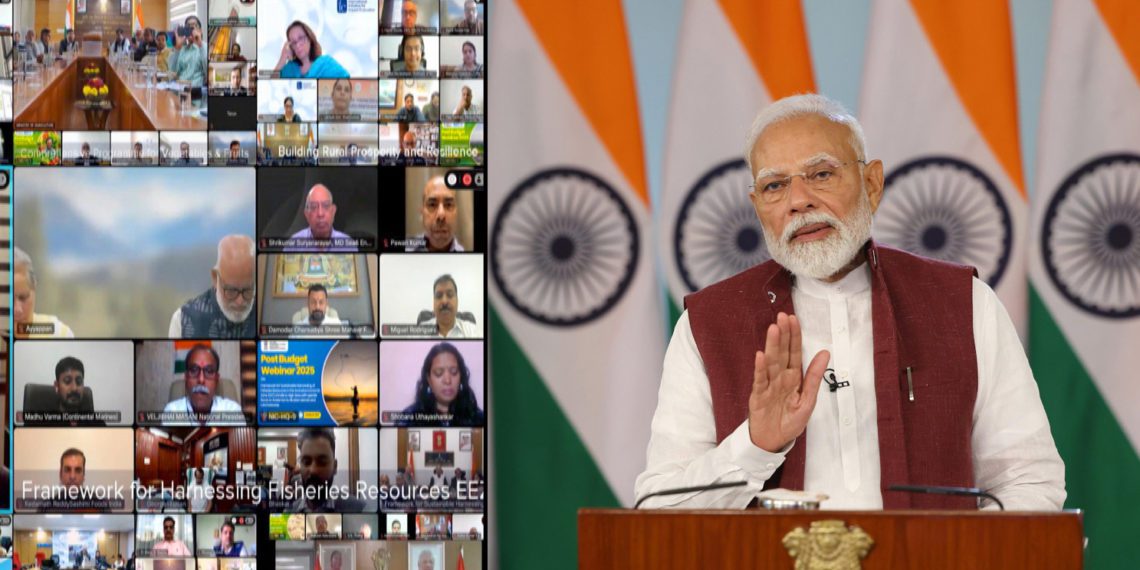Prime Minister Narendra Modi addressed the post-budget webinar on agriculture and rural prosperity via video conferencing, emphasizing policy continuity and a new vision for “Viksit Bharat.” He highlighted the government’s commitment to empowering farmers and ensuring rural prosperity.
The webinar saw participation from various stakeholders, including representatives from the Department of Agriculture & Farmers Welfare (DoA&FW), the Reserve Bank of India (RBI), NABARD, Scheduled Commercial Banks (SCBs), Regional Rural Banks (RRBs), State and District Cooperative Banks, State Level Bankers’ Committees (SLBCs), Krishi Vikas Kendras (KVKs), and farmers from across India.
Modi reaffirmed the government’s goal of an empowered and prosperous farming community, emphasizing agriculture as a key driver of development. He highlighted two major objectives: the growth of the agriculture sector and village prosperity. The PM-Kisan Samman Nidhi Yojana, initiated six years ago, has already transferred nearly ?3.75 lakh crore directly to 11 crore farmers, strengthening the rural economy. The farmer-centric digital infrastructure ensures that benefits reach intended recipients without intermediaries.
He lauded experts and stakeholders for their support in executing various schemes transparently and efficiently. He urged them to aid in implementing the budget’s new announcements. Modi also emphasized the importance of agricultural reforms, farmer empowerment, and a strong value chain, citing India’s record-breaking agricultural production of over 330 million tons and horticultural production surpassing 350 million tons. He attributed this success to government-led initiatives spanning from seed selection to market access.
The PM Dhan Dhanya Krishi Yojana was introduced to boost the development of 100 least productive agricultural districts. Modi referenced the positive impact of the Aspirational Districts Program and stressed the importance of increased pulse production, as 20% of domestic consumption still depends on imports. While India is self-sufficient in chickpeas and mung beans, the production of pigeon peas, black gram, and lentils needs further enhancement. He advocated for promoting hybrid seeds and advanced breeding technologies to address climate change, market volatility, and price fluctuations.
Highlighting the Indian Council of Agricultural Research’s (ICAR) advancements, Modi noted that over 2,900 new crop varieties have been developed between 2014 and 2024, including grains, oilseeds, pulses, fodder, and sugarcane. He stressed the need to make these varieties affordable and accessible while minimizing weather-related production risks. The budget’s announcement of a national mission for high-yield seeds aims to enhance seed availability through private sector participation.
The Prime Minister also underscored increasing consumer awareness about nutrition. Significant investments have been made in horticulture, dairy, and fisheries to meet growing demand. He urged stakeholders to explore innovative ways to promote diverse nutritional foods in both domestic and global markets. The government has announced the formation of the Makhana Board in Bihar to support this initiative.
Recalling the 2019 launch of the PM Matsya Sampada Yojana, Modi noted the significant improvements in fisheries infrastructure, production, and post-harvest management. Investments in the fisheries sector have doubled production and exports, and sustainable fishing plans for India’s Exclusive Economic Zone are in progress. He urged stakeholders to enhance the ease of doing business and protect traditional fishermen’s interests.
Modi reiterated the government’s commitment to strengthening the rural economy. He highlighted initiatives like PM Awas Yojana-Gramin, Swamitva Yojana, and Pradhan Mantri Gram Sadak Yojana, which have improved housing, land ownership rights, and rural connectivity. The goal to create 3 crore “Lakhpati Didis” has seen 1.25 crore women already achieving financial success. Investments in skill development and technology are opening new employment avenues in rural areas.
He urged all stakeholders to discuss ways to enhance existing schemes for maximum impact. Concluding his address, Modi expressed confidence that collective efforts would drive rural prosperity, empower villages, and ensure swift implementation of the budget’s schemes. He called for unified action to achieve national agricultural and economic goals.













































